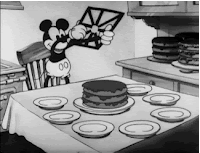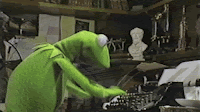Welcome to 2019! A dystopian world unlike any you could’ve imagined…
I wanted to start the year by just tossing out a couple introductory thoughts for you about writing. Or why we’re writing, really. Maybe something to consider while those resolutions are still firming up.
Really, it all kinda boils down to one question.
Why are you doing this?
It’s a question I think a lot of folks don’t ask themselves, and it’s kind of important. What I actually hope to get out of an activity should really effect how I approach said activity. Is writing just a hobby for me? Is it a form of artistic expression? Do I just want to make a little money on the side with it or am I hoping to make a career out of this? Do I just want all the little side perks that come with being a famous writer? Maybe some combination of some or all of these things?
Almost all of these are valid ways to approach writing. But if I don’t know—or I’m not honest with myself—about where I want to end up, I can waste a lot of time on the wrong path. And when I don’t get where I wanted to go… well, there’s only one person I can blame.
Now, I’m willing to bet some folks reading this are already grumbling. Internally if nothing else. Experience has taught me that a lot of people don’t like talking about writing in a concrete way like this. If I had to guess why, I think it’s because keeping things vague and soft is comfortable. It’s easy. If I don’t declare what my goals are, it’s pretty much impossible for you to tell me I’m not getting closer to them. I can just keep doing whatever I want in this big hazy cloud of possibilities and declare success.
So let’s not talk about writing.
Let’s fall back on one of my favorite parallels—cooking. We can talk about cooking without anyone getting mad, right? It’s a safe, simple topic.
Why do you cook?
I mean, we all cook to some degree or another. Maybe it’s just using the microwave or the toaster, but I think everybody reading this can at least feed yourself without resorting to ordering a pizza, right? Some of us might even be able to make pizza from scratch. Or maybe go all the way to ravioli in vodka sauce with homemade garlic bread.
(I might be a bit hungry while I type all this—just warning you now)
So yeah, some people might be happy just having those bare basic skills and maybe some folks want to do a bit more. Maybe you’re just really into pasta or baking or soups and you have a lot of fun experimenting with them.
Or maybe I want to go all the way with this. I want to be a chef. Like, a trained and accredited chef. Do they accredit chefs? You get the idea. I want to wear that white jacket and the apron and work in a restaurant. Hell, maybe I want to own a restaurant!
 It’s possible to approach cooking a lot of different ways, depending on where I want to go with it. And there’s nothing that says I can’t change direction at some point. I can just play around with pies and cakes for my own amusement and maybe one day decide I want to open a bakery. But I need to acknowledge that’ll mean a big shift in how I approach things. Baking cookies for me and my friends is not the same as baking them for the Wednesday lunch rush.
It’s possible to approach cooking a lot of different ways, depending on where I want to go with it. And there’s nothing that says I can’t change direction at some point. I can just play around with pies and cakes for my own amusement and maybe one day decide I want to open a bakery. But I need to acknowledge that’ll mean a big shift in how I approach things. Baking cookies for me and my friends is not the same as baking them for the Wednesday lunch rush.
Another thing about cooking—we can all agree there are some rules to it. There are tons of recipes that’ll have flexibility, sure, but in the end, it needs to be edible. Some ingredients need to be cooked certain ways. Yeah, breaking these rules is possible, but it’s really important that I know how to break them. Like, I can do things with raw eggs, but it’s risky. If I don’t know exactly what I’m doing, I might make someone sick. Like full-on poison them. Fatally.
And that’s not going to get me a lot of repeat dinner guests.
Or repeat customers, if I’ve decided to go pro with this.
That’s a nice lead in for my last point about cooking. The business side of it. Yeah, maybe you don’t want to go that way, but it’s worth at least thinking about for a minute. I think the vast majority of us wouldn’t mind making money at our cooking, right?
(everybody remembers this is an extended metaphor, right?)
The minute I decide to start thinking about cooking in a business sense, I need to start thinking about it… well, like a business. If I want to open a restaurant or a bakery, I need to consider what my customers want, sales numbers, investment returns, and more. It’s painful to say, but at this point I need to ignore the art side of things for a bit and start looking at hard numbers.
Like, okay, cooking’s always going to have a personal edge to it. I really like things on the spicy side. My partner’s a vegetarian. Maybe you hate anything that doesn’t include bacon.
But once we’re talking about cooking as a business, it’s not all about us anymore. It’s about them—my potential customers. What do they like? What are they going to spend money on? What are they going to take a chance on? Yeah, my maggot brulee might be the most amazing (and carbon-friendly) dessert you’ll ever have, but I shouldn’t be too shocked if nobody wants to try it. Customers probably won’t want to eat it (not enough to support a restaurant, anyway) and investors probably won’t want to back my little writhing cafe.
And again—this doesn’t mean the maggot brulee is bad. This isn’t about good or bad, it’s about making smart business decisions. Cooking professionally means not doing as many adventurous things, and being very smart about the risks I take and the rules I break. It means finding that perfect sweet spot where I can make my customers (and investors) feel very safe and comfortable while also getting them excited about trying something new.
It’s tough. That’s why so many restaurants fail. Depending on which numbers you look at, it’s generous to say only one out of five restaurants lasts three years.
Which, honestly, is still better numbers than most writers.
That’s what we’ve been talking about, remember?
Y’see, Timmy, there’s no “correct” endgame with writing. You wanting to do it just for the art isn’t any worse or better, decision-wise, than me doing it for a living. They can do it for fun, she can do it as therapy, and he can do it as an ongoing social-psychological exploration as what it means to be a brilliant mind trapped at the mall food court serving orange chicken to capitalist sheeple every day (it’s too deep for you to understand, just deal with it). Whatever I want to do with writing… that’s the right choice for me. And whatever you want to do is the right choice for you.
Just make sure you’re on the right path to get to that goal. Or at least headed generally toward it. Path A could be a smooth, unchallenging run, but it doesn’t lead to D. And path C lets me take the moral high ground, but it’s not going to get me to E.
I freely admit, this blog is overall about getting on a career path with writing. Or maybe getting over some of the rough parts of that path a little easier. And you may find some tools here you can use on other paths. Rope’s very helpful with mountain climbing, but you use it a lot in sailing, too. Some writing advice is like that. It can get you closer to publication, but it can also make your Dungeons & Dragons blog really pop.
So… that’s what we’re going to do this year.
And maybe a tiny bit of self promotion for a couple projects coming out.
Next time, well… we should probably talk about getting started.
Until then, go write.
 But overall, this is just advice. Some of it’s going to work for you, on this particular project. Odds are a lot of it isn’t. That’s how this whole writing-art thing goes. You get a huge pile of thoughts and ideas and advice dumped on you and it’s your job as the writer to sift through all of it and figure out what’s going to work for you and what isn’t.
But overall, this is just advice. Some of it’s going to work for you, on this particular project. Odds are a lot of it isn’t. That’s how this whole writing-art thing goes. You get a huge pile of thoughts and ideas and advice dumped on you and it’s your job as the writer to sift through all of it and figure out what’s going to work for you and what isn’t.








